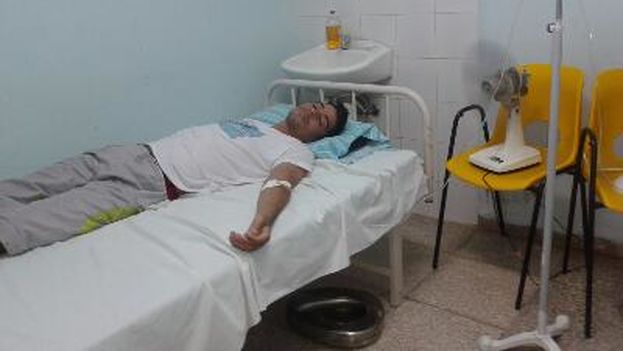
14ymedio, Reinaldo Escobar, 4 August 2016 — On August 13, the 90th birthday of Fidel Castro, there will not be only official festivities. If the young activist Carlos Oliva Amel holds to his decision not to eat, that day will mark one month of his hunger strike. The government opponent is fighting an uphill battle: his body deteriorates and the government appears deaf to his demands. This member of the Patriotic Union of Cuba (UNPACU) is fading slowly without his demands being answered.
Amel Carlos Oliva told 14ymedio during on phone call on Wednesday, the 22nd day of his fast, that he felt a lot of pain “in the knee, and acidity.” Two days ago he received a rehydration drink at the September 28 Polyclinic in Santiago de Cuba that eased the “heartburn” but now he is again suffering from “nausea and dizziness.” The dissident complained that in recent days he has been totally surrounded by a “strong repressive operation.”
A few yards from Oliva, at the UNPACU headquarters in Santiago de Cuba, opposition members Oria Josefa Casanova Moreno and Zulma López Saldaña have gone without food from the 16th and 18th of July respectively. This morning they were visited by two doctors who arrived from the nearest polyclinic and insisted that the two women should be “rehydrated” as soon as possible.
“We are waiting for ambulances to come to take them,” explains Yriade Hernandez Aguilera, a board member of the opposition organization. This activist who responds to calls in minutes, attends to the strikers and monitors the operation that that is expanding around them.
Oliva had his belongings confiscated on 24 May. Two laptops, a cellphone, a hard disk and a Nanostation (to receive and repeat WiFi signals) and some money were taken from him in that arbitrary dispossession that turned his world upside down. In July they returned and along with a laptop they took a Samsung Galaxy S6 cellphone, 6,421 dollars, 12 convertible pesos, a kitchen knife and two screwdrivers.
On July 12 Oliva received a call from the police telling him he should wait for State Security to contact him for the return of his belongings, but the call never came. The dissident decided that night to stop eating and publically announced his hunger strike the following day, 13 July.
State Security officials tried to pacify him on a visit to the police station, saying that they would return one of the laptops, but the dissident stood his ground: “I’ll take all or nothing.”
Oliva, in a bare whisper through the phone line, tells this newspaper that “a high official” from State Security “alias The Pole,” assured him that there was “no need” to carry out a hunger strike. “With one call we would have returned your things,” was the key message the official sent through Oliva’s father.
Wednesday Oliva was still committed to achieving, through his empty guts, a correction from the repressive apparatus and the return of his property. But the outcome is uncertain and his strength is beginning to fail him.
